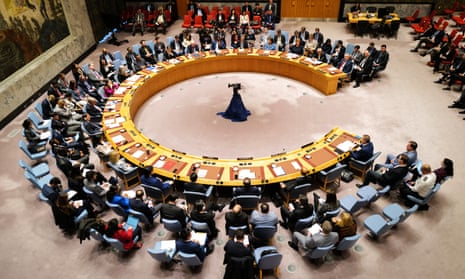How strange that my interpretation of the situation in the Middle East is the reverse of Simon Tisdall’s (After Iran’s attack on Israel, the world must act: this is a crisis that threatens us all, 14 April). I believe that everything from 7 October to date has been carefully orchestrated by Iran and that the events of last Saturday night are part of the ultimate plan to escalate.
Iran’s mission is to secure a dominant position among Muslim countries in the Middle East and to ensure that its rival Saudi Arabia never occupies that space. The buildup of pro‑Iranian “militias” in the countries surrounding Israel is a major part of the strategy, and anti-Israeli and anti-US sentiments are just tools to rally the “troops”, as is the pro‑Palestinian rhetoric. The “militias” can easily be used against the Saudis at a future date.
This conflict is a two-way street, with both main protagonists having their own agenda: we all know what Benjamin Netanyahu’s is. The poor Palestinians are caught in the middle of all of this, and at the moment they are being ignored. To only look at the machinations of one side in this conflict is highly dangerous.
Ruth Rosenthal
London
I agree with Simon Tisdall’s sentiment that all leaders are to blame and that each nation involved seems driven by an egotistical leader with a political vision warped by power and ideology. However, less is said about the role of the international community in allowing the increasingly dangerous situation we find ourselves in. The US, with tacit support from the UK and France, has vetoed calls for a permanent ceasefire, acquiesced to Israel’s horrors under the thin veil of “legitimate right to defend itself”, and continued to supply the weapons that are causing this humanitarian and moral disaster.
Tisdall argues that Iran should have raised its concern through diplomatic channels and by utilising UN legal infrastructure. Why would it? These mechanisms have clearly demonstrated their limits – limits that will continue to exist as long as the security council and its five powers continue to yield such disproportionate power through their veto rights.
Adrian de León
London
Simon Tisdall is right. With the war in Gaza going badly and the creation of a Palestinian state firmly on the table, Netanyahu needed a distraction. And he found one. Bombing the Iranian consulate in Damascus succeeded in drawing a response from Iran – and Iran, the US and the UK fell for it hook, line and sinker. To hear the foreign secretary, David Cameron, saying Israel has a right of response, while ignoring the bombing of the consulate, takes the breath away.
Phil Tate
Chester
Simon Tisdall writes quite correctly that “It would have been smarter by far if Iran, faced with the embassy outrage, had taken its grievances to the UN and the international court in The Hague, and raised the issue through friends in the G20 and the Brics grouping.” But we all know that none of this would have had any useful consequence. The game is rigged. All diplomatic avenues were closed long ago by the very powers that are now accelerating into the maelstrom of war.
Alfredo Louro
Calgary, Alberta, Canada
